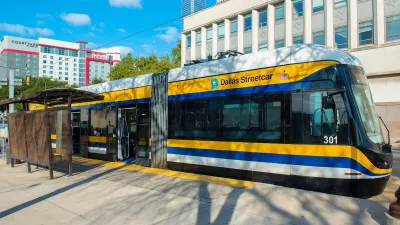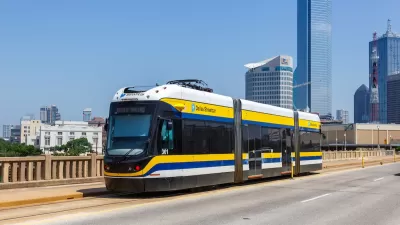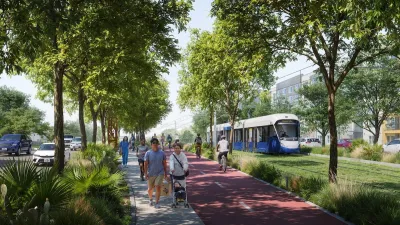State lawmakers could pull funding from the state’s largest transit agency and the ambitious Project Connect, a voter-approved transit project in Austin.

Texas state legislators are proposing bills that would gut funding for the Dallas Area Rapid Transit system and the massive public transit project in Austin known as Project Connect.
As Joshua Fechter explains in The Texas Tribune, “North Texas legislators want to reroute 25% of the sales tax revenue collected by DART, which serves Dallas and 12 neighboring cities, toward a ‘general mobility program.’ Those cities could then draw upon those funds to pay for projects like building sidewalks and roads and installing traffic signals.” The loss of revenue would be catastrophic for the transit agency, which would have to make service cuts and layoffs that would eliminate service for over 125,000 riders.
According to Fechter, “Regional transportation planners warn cutting DART’s funding so drastically will hamper mobility across the entire Dallas-Fort Worth region, worsen air quality and throw a wrench in public transit plans for next year’s FIFA World Cup, when the region will host nine matches.”
Two bills sponsored by state Republicans would eliminate Project Connect’s funding plan. The bills’ sponsors argue that the funding mechanism used to create revenue for the project, which was approved by Austin voters, should not be used for paying debt and therefore cannot support Project Connect’s capital costs.
FULL STORY: Texas Republicans take aim at public transit in two major cities

Study: Maui’s Plan to Convert Vacation Rentals to Long-Term Housing Could Cause Nearly $1 Billion Economic Loss
The plan would reduce visitor accommodation by 25,% resulting in 1,900 jobs lost.

North Texas Transit Leaders Tout Benefits of TOD for Growing Region
At a summit focused on transit-oriented development, policymakers discussed how North Texas’ expanded light rail system can serve as a tool for economic growth.

Why Should We Subsidize Public Transportation?
Many public transit agencies face financial stress due to rising costs, declining fare revenue, and declining subsidies. Transit advocates must provide a strong business case for increasing public transit funding.

How to Make US Trains Faster
Changes to boarding platforms and a switch to electric trains could improve U.S. passenger rail service without the added cost of high-speed rail.

Columbia’s Revitalized ‘Loop’ Is a Hub for Local Entrepreneurs
A focus on small businesses is helping a commercial corridor in Columbia, Missouri thrive.

Invasive Insect Threatens Minnesota’s Ash Forests
The Emerald Ash Borer is a rapidly spreading invasive pest threatening Minnesota’s ash trees, and homeowners are encouraged to plant diverse replacement species, avoid moving ash firewood, and monitor for signs of infestation.
Urban Design for Planners 1: Software Tools
This six-course series explores essential urban design concepts using open source software and equips planners with the tools they need to participate fully in the urban design process.
Planning for Universal Design
Learn the tools for implementing Universal Design in planning regulations.
City of Santa Clarita
Ascent Environmental
Institute for Housing and Urban Development Studies (IHS)
City of Grandview
Harvard GSD Executive Education
Toledo-Lucas County Plan Commissions
Salt Lake City
NYU Wagner Graduate School of Public Service





























